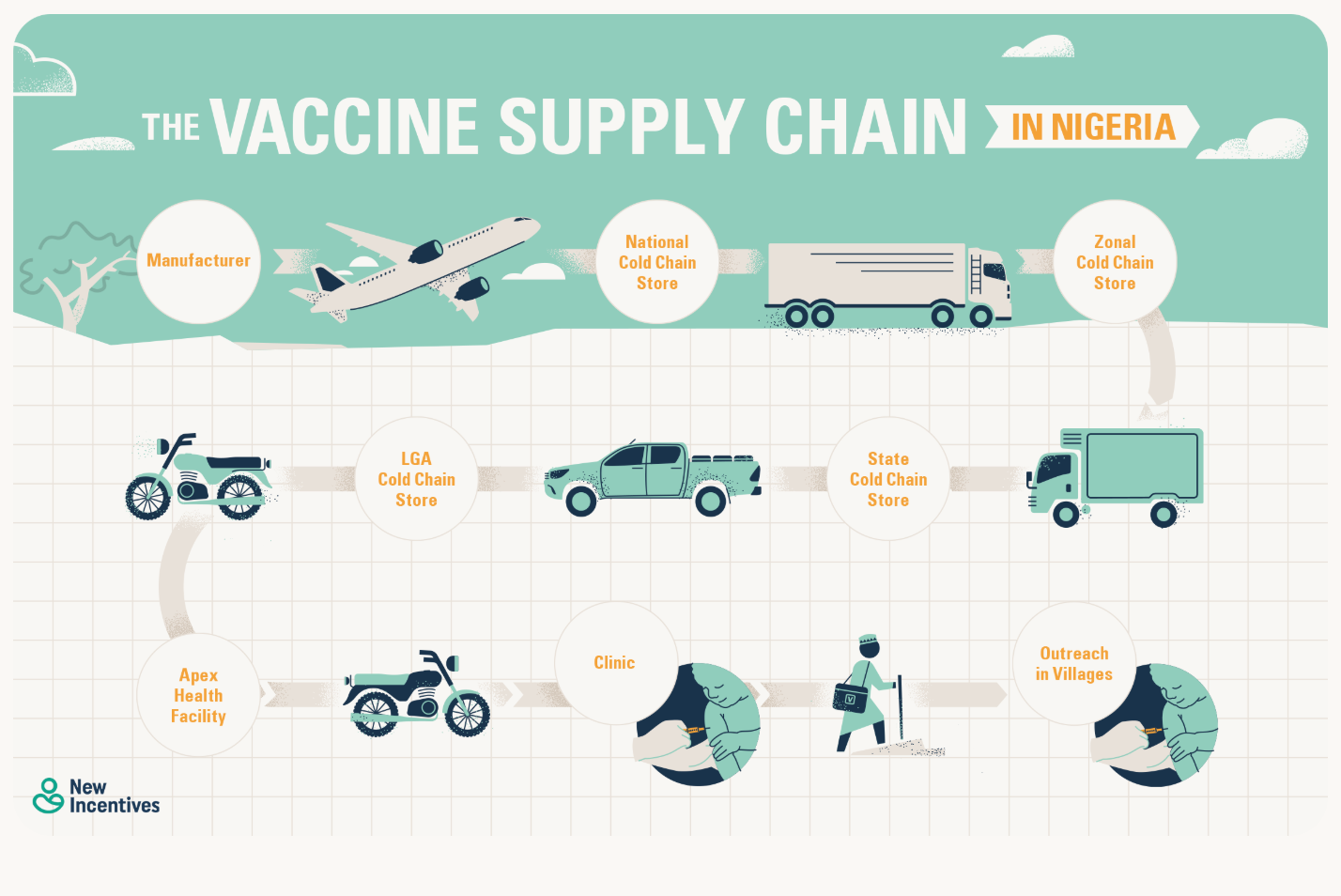Home - Blog
Home - Blog
%20(1).png)
Without proper refrigeration at remote clinics, getting vaccines to children takes meticulous planning and dedication.
Every Tuesday morning, Mustapha Shuaibu arrives at his clinic with a small light blue cooler of vaccines, ready to immunize the babies strapped to the backs of their mothers, who will soon be lining up outside. Mustapha looks spotless and professional in his white uniform, and with a broad smile, he makes his arrival look effortless. But follow him, and you will learn his work is far more complex than it appears at first glance.
Transporting vaccines from their arrival in Nigeria to remote clinics like this one requires numerous steps and dedicated staff. Government staff called cold chain officers must move vaccines from location to location while maintaining the critical temperature range. Then, clinic staff like Mustapha must travel many kilometers by motorcycle, canoe, or on foot to bring the vaccines from bigger “apex” clinics to more remote clinics––a process that takes patience, care, and meticulous planning.

Damba clinic is like many clinics in remote northern Nigeria—it lacks a solar direct-drive refrigerator, the kind needed for vaccine storage. So, every Monday, the day before the weekly immunization day, Mustapha leaves his rice farm early and travels on his motorcycle 11 kilometers to the LGA Cold Chain Store in the nearby village of Argungu to collect vaccines. Then he transports them to a closer clinic that has the necessary cold storage equipment to store them overnight.
"I do this a day in advance to avoid delays," Mustapha explains. "If I had to collect vaccines and travel to Damba on the same day, I would arrive late." Mustapha says that, in the past, caregivers would leave if he arrived late from Argungu.
The next morning, he travels back to the clinic to get the vaccines he stored the night before. Due to security issues in the area, Mustapha must pass through six security checkpoints along the way.
When he finally arrives at his clinic with the vaccines, a New Incentives’ field officer opens the cooler and carefully checks vials. The field officer documents what antigens are available for the day’s session, makes sure they have not expired or been exposed to heat, and takes photos of his observations. This process is part of each immunization session across the more than 7,000 clinics where New Incentives operates, providing clinic-level vaccine stock data that is shared with the state.
(To learn more about the data we share with states, see our latest Quarterly State and LGA Report.)
Mustapha used to go door to door telling parents to bring their children to the clinic, but he says those efforts were often fruitless. Now, getting parents to bring their children to the clinic isn’t such a struggle, and for that, he credits New Incentives. Since New Incentives launched in this area in 2023, turnout at immunization sessions has markedly increased. Yet increase in demand brings logistical challenges as well.
As Pharmacist Nafiu Roni, the Zonal Cold Chain Officer of the North West Zone, puts it: "Logistics is the most important part of the immunization supply chain, yet the most neglected in the whole process."
Mustapha says he receives ₦500 ($0.33) monthly for vaccine transportation, but each trip to transport the vaccines costs him ₦2,000 ($1.32) in motorcycle fuel.
Mustapha's role is one link in an incredibly complex chain. The path from vaccine arrival to vaccine administration faces numerous challenges: unreliable electricity, extreme weather forcing health workers to transport vaccines via canoe through flood zones, security concerns from kidnapping and banditry, inconsistent funding, and long distances requiring hours of travel to remote clinics.
As demand increases from programs like New Incentives, our role in supporting government efforts becomes more critical. While government agencies procure vaccines and manage the supply chain, New Incentives focuses on coordination and communication to identify and resolve bottlenecks. Our daily work includes coordinating vaccine requests, hosting monthly roundtable meetings with state cold chain officers, conducting availability assessments through our supply-side dashboard, and investigating each stockout's root cause. To ensure comprehensive support for immunization sessions, we track all supplies—vaccines, syringes, diluent, and safety boxes—in the clinics where we operate.
Personal sacrifices like Mustapha's highlight the dedication of healthcare workers who are responsible for providing life-saving vaccines. Every successful immunization session represents a triumph of coordination and shared commitment to child health.
Read more in our post about vaccine supply challenges and how we work to address them.
Get the latest blogs and program updates sent to your inbox. We send emails sparingly.

